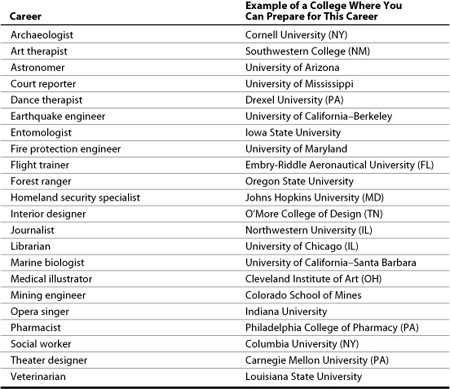Who Can Tell Me About Careers?
Information about jobs that people do is all
around us. Yet we usually miss it. For example, have you ever thought
of asking your doctor questions like the following: Why did you become
a doctor? What do you have to do to become a doctor? Where did you go
to school? How did you choose which kind of doctor to be? What do you
like best about your job? What do you like least?
Many of us never ask these kinds of
questions. But why not? Most people enjoy talking about themselves and
will gladly give you answers.
People all around you—family, friends,
parents of classmates, teachers, and neighbors—can help you learn more
about careers. Don’t be afraid to ask hard questions. Yet understand
that the people you ask won’t be able to give you magic answers that
make your decisions for you. However, the answers you get will help you
find your own direction.
What Are Career Days?
Your school probably offers many opportunities for you to learn more about careers. It may even have a career day
every year. Career days are special days when people from your
community share information about their jobs, either at your school or
when you visit their workplaces.
Many people have careers that you would
quickly think of if you were asked to make a list of jobs—lawyer,
doctor, police officer, teacher, and so on. Others have careers you may
not think of quite so quickly—editor, college registrar, Web master,
criminologist, microbiologist, fashion designer, factory supervisor, or
surveyor.
Job shadowing provides another way to learn
about specific careers. You learn more about careers by following (or
shadowing) and observing people as they go about their day-to-day
business.
To learn more, go to www.jobshadow.org.
If you go to a career day, talk to as many
people as you can. Listen closely and ask questions. Some people have
always known what they wanted to do. Others have made choices based on
experiences and opportunities that came along. People often go in
different directions than they expected.
Some people want to be their own boss. Some
prefer working for others, letting them worry about running the
company. Some people want to travel. Others want to stay closer to
home. Some people want to do a job that has little to do with their
personal hobbies. Others want to combine their interests with their job.
What Kinds of Career Programs Are Available?
Many business, civic, and professional groups
and other organizations have programs that can help you learn about
careers. Several government agencies have programs that can help, too.
Some of these programs are offered at your school while others are
offered at different locations. Such programs may help you explore a
specific career (such as reporter) or an entire field (such as publishing).
These programs include summer camps, mentoring
(working one-on-one with an adult), school and after-school programs,
jobs, tours, and activities that teach you leadership skills. Many of
these programs, especially those run directly through your school, are
free or low cost. Others can be expensive. Even these, however, often
can provide financial help to students who need it.
Preparing for Careers at Different Colleges
